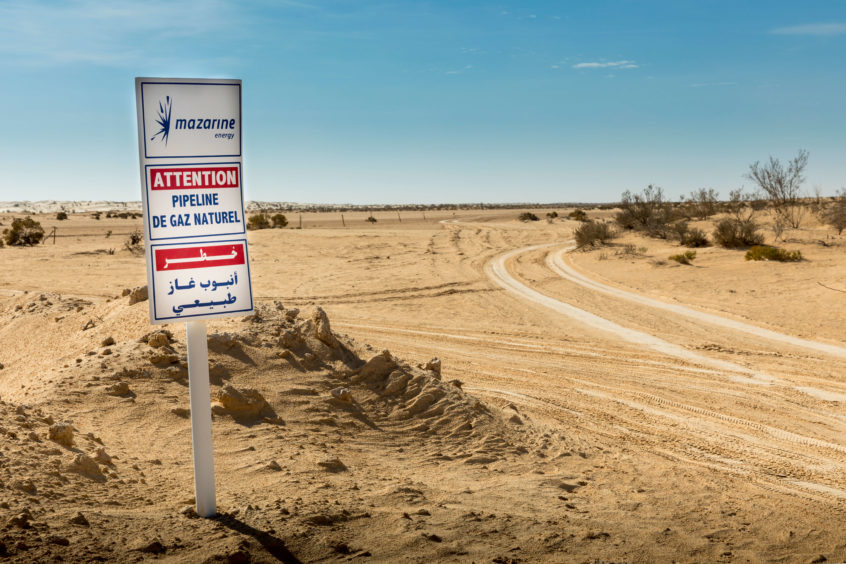
Tunisia holds opportunities for investors, but government processes and local unrest have slowed developments.
OMV officially started producing from the Nawara field in early 2020, with this project the country’s largest major development. OMV (Tunesien) Production’s general manager Wilhelm Sackmaier raised a number of concerns around the country’s operating environment during IN-VR’s online Mediterranean Gas & Energy Week.
“Oil and gas production is decreasing and fields are getting mature, while energy demand is increasing,” Sackmaier said. OMV produces from eight concessions in Tunisia, of which it operates seven. The company’s production is 10,400 barrels of oil equivalent per day.
“Political and social instability” hampers new investments, with “unrealistic expectations” among the citizens of Tunisia. This leads to strikes and blockades, he said.
“We have seen a significant number of strikes in 2019-20 … with 115 days of blocked pipelines,” Sackmaier said. Since the 2011 revolution, a number of popular protests have paralysed work, in particular around Kamour.
Local benefits
Protesters have called for more local benefits and employment stemming from Tunisia’s natural resources. The OMV official called for government and unions to help make the case for industry, which will generate jobs, rather than destroying them.
Furthermore, the Tunisian regulator does not move fast enough in approving permits and there is scope for additional work in mature fields, Sackmaier said.
Despite the challenges, there remain opportunities, the OMV executive said, a point Perenco’s Yves Postec agreed upon.
Tunisia is broadly welcoming to exploration, Postec said, although the company has found development and licence renewals somewhat slower.
“We want to invest now, extensions are needed now. This is quite a challenge for the ministry” and Entreprise Tunisienne d’Activités Pétrolières (ETAP), Postec said, at the IN-VR summit. “The country needs investments but the process could be more fluid. Investors are ready.”
Perenco has made a number of moves in the North African state. In 2017, it took a 50% stake in the Ashtart concession and, in 2018, a 45% stake in Chergui.
The company plans for additional work in Tunisia, which is made possible by regional integration, Postec said. “Integration relies on infrastructure to link concessions, making them strong and mutualising the fixed costs.”
Solar plans
Perenco is also working on a small pilot 1 MW solar project. Postec said this would provide the company with information on the technology and “also generate synergies in terms of lending”. The solar project should be commissioned by mid-year, he said, helping Perenco’s energy transition strategy and local CSR initiatives.
Another company working on a combination of hydrocarbons and solar is Mazarine Energy. The company’s CEO Edward Van Kersbergen said that Mazarine was “developing energy in the wider sense”. As such, it is working on a 10 MW solar project, which should be commissioned this year.
“It’s a way of additionally investing in the region, creating employment and CSR. I hope there’s more to come. There are also opportunities for hydrogen.”
Historically, Mazarine has focused on hydrocarbons, drilling exploration in 2015 and 2019. The Sidi Marzoug-1 well flowed at 2,700 bpd in 2019. The company tested a horizon at the well that had not previously been tested by its neighbours.
Pipeline work
“We’re looking forward to new opportunities for production. We’re laying the pipeline as we speak and making use of infrastructure already in place.” Similar to Postec, van Kersbergen noted the benefit of existing infrastructure, which allows new discoveries to be tied in.
Mazarine could have installed the 15 km tie back in four to five months, he said, but it has actually taken two years. “We need to increase the pace of development. Oil and gas has a long future but pace is of the essence.”
“After discoveries in 2015 and 2019 we see further appraisal potential. We’re planning, for this year and next, to carry out two exploration and appraisal wells. We have been lucky enough to have a 100% success rate with three wells. I’d like to believe we have done a good job but this is as much a reflection of the area in which we operate,” van Kersbergen said.
Recommended for you

